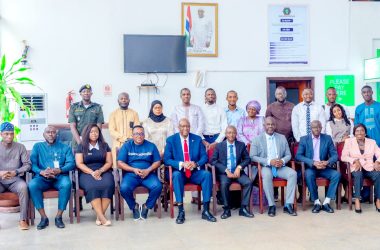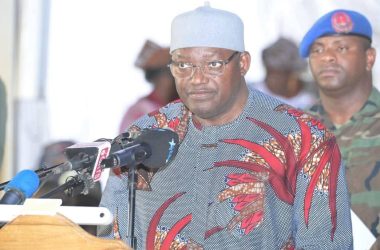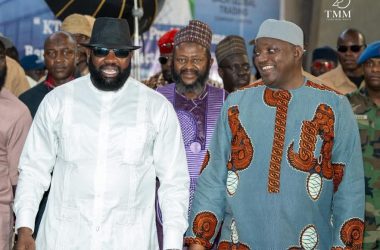 (JollofNews) – The leader of the Gambia’s main opposition United Democratic Party (UDP), Lawyer Ousainou Darboe, has condemned President Yahya Jammeh’s decision to restrict foreign-exchange trading in the West African country.
(JollofNews) – The leader of the Gambia’s main opposition United Democratic Party (UDP), Lawyer Ousainou Darboe, has condemned President Yahya Jammeh’s decision to restrict foreign-exchange trading in the West African country.
Last Monday, Mr Jammeh in response to the free-fall of the local currency, Dalasi, issued a directive restricting foreign nationals and Gambians to taking US$10,000 in foreign currency and also and pegged the value of the Dalasi.
But Lawyer Darboe has described the move as another deliberate decision by Mr Jammeh to manipulate the economy and artificially fix prices as a veneer to cover-up his government’s failed economic policies that have given rise to the unprecedented economic woes the country currently faces.
In a press statement, Mr Darboe said: “Once again, Gambians are greeted with dumbfounded news that major currency values will be pegged and depreciated against the Dalasi through a directive from the Office of the President. The directive, as usual, came-in without warning or engagement with the business sector as expected of any responsible government.
The shock on both businesses and the Gambian Diaspora is unimaginably devastating with all the dare consequences on the economy. As of Friday, 1st May, banks were selling £1 at D80, the US1 at D52 and 1Euro at D60.
But since the untimely decision by the Office of the President, banks and money transfer bureaus are forced to sell US Dollars at $1 at D35, £1 at D50 and 1 Euro at D40.
By rough estimate, as from the date of this rash, manipulative, and unwise presidential decision, financial services dealing in foreign currency business are making a loss of D17 per $1, D30 per £1 and D20 per 1 Euro. The loss is within the conversation rates and the transfer fees commission. The loss is further in two fold, the banks lose and the Forex bureaus also lose.
It is against business sense to sell commodities at below the cost price. Forex bureaus, local Gambian banks, Western union, Money Gram, RIA all took Dollars, Pound sterling, Euros from customers at the market price up to 2nd May, after which period, the ‘government directives’ came into force, instructing banks to buy or sell the foreign currencies at below the market rate.
This is the causes of the serious loses to all players. Within the larger context of cumulative shock and impact, Gambian money transfer bureaus operating in U.K, and other parts of Europe and America are expected to make operational loses of not less than D100 million.
It has to be noted that The Gambia economy under the present regime is in a worst situation than it had ever been in her modern history. The standard of living and the purchasing power of the average citizen has declined significantly as a result of the seemingly unstoppable high inflation affecting every sector of the economy. The most noticeable hope for Gambians inside the Gambia is the remittances sent in by Diaspora Gambians.
However since the Presidential decision to artificially peg the Dalasi against major international currencies, Diaspora Gambians are now forced to send in more funds as financial aid to compensate for the differences between the old exchange rate and the new artificial rate set by the President.
The UDP sees this as yet another deliberate decision by the Executive to manipulate the economy and artificially fix prices as a veneer to cover-up the APRC government’s failed economic policies that have given rise to the unprecedented economic woes the country currently faces.
The UDP strongly condemns this latest interference in the management and the regulation of the markets. It is a serious violation of trust and confidence Gambian people bestowed on their government.
As a party, we sympathise with the Gambian people especially our hard working diasporas who have to adjust at the expense of their pauses and family comfort, to make room for this callous, and unplanned decision by the President to unilaterally appreciate the dalasi against major international currencies.
The combine impact this sudden and drastic tinkering with the exchange rates will cause to the economy is enamours. It will lead to reduced net inflow of foreign exchange to the country, some financial service particularly foreign exchange bureaus will have to lay-off staff, some may default in rent payments, and more seriously, Gambian businesses will eventually lose out because ultimately, with the confusing signal the government is sending out, it may be difficult to get Bank Guarantees and Letters of Credit (LCs) to proof their credit worthiness to their overseas business partners.
The United Democratic Party recommends that, the best way to regulate the exchange rates is to have a stage by stage or incremental appreciation of the value of the Dalasi.
We believe this latest ‘Executive order’ will lead to hoarding of foreign currency, which will create artificial shortage and thus force the exchange rates to go up. The losers here are everyone: the importers, Diaspora Gambians, ordinary people, and the government itself in the form of reduced tax revenues.
It is important to note that a country’s exchange rate is one of the most important determinants of relative level of economic health. Exchange rates play a vital role in a country’s level of trade, which is critical to all free market economy. For this reason, exchange rates cannot and should not be meddled with to suit the President’s whims and caprices. Interest rates, inflation and exchange rates are all highly correlated; they impact on each other. The economy should be managed without emotion or undue pressures from the executive.
In barely 3 months, the Gambia government received an emergency loan from the IMF in the region of (US$10.8 million). The fact that we received an emergency loan indicates a budget deficit and inability to finance the government expenditures.
A drastic reduction of foreign direct support to the government because of its lack of respect for human rights and rule of law, have seen the Gambian economy contrast to a near stagnation. Tourism which is one the country’s main foreign exchange earner, has also been severely hit following the Ebola outbreak in West Africa in 2014. Gambia derives 30 per cent of its export earnings from tourism. But a 60 per cent fall in tourism has led to a 12 per cent depreciation of the local currency (Dalasi) against major international currencies causing an accelerated increase in food prices and other consumer goods.
The president and his APRC Party have failed the people and massively for that matter. Power and brute force cannot be used to regulate an economy. Competent and qualified technocrats must be allowed to carry out their duties without fear of harassment. The office of the President has become a cocktail of many blends. This is why the UDP demands an end to the 20 years of failed AFPRC/APRC misrule characterised by irrational, childish and adventurous policies that continue to destroy the fabrics of the very survival of the country.”





